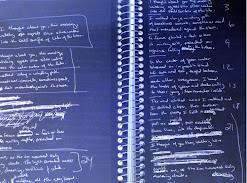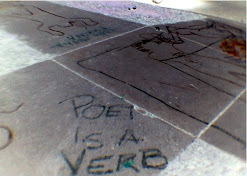Jo, from A Broad's Thoughts From Home, just tagged me in this meme: list at least four things you think a beginning poet should attend to and four mistakes you think a poet should avoid. Although its been over a month since I last taught (ah freedom!), I'll put the teacher hat on and see what I can do with it. Please excuse any hectoring on my part -- I just sat through an hour and a half long meeting, and I'm feeling loopy!
4 Things a Beginning Poet Should Attend To
1) Read other people's poetry besides your own.
I kind of already covered this in my last poet=verb installment, and in my rampant and obsessive posts about books, but I think that it is vital that all writers read. How else can you know what has come before you and what you can contribute to the dialogue of language?
This is especially true in poetry. In the past two hundred years, there have been scores of stylistic and ideological movements in poetry. By reading those people you like, and the people they liked, and so forth, you are tracing your literary heritage and finding your place in the poetry world.
2) Support small presses, small magazines, independent bookstores and other venues for struggling poets.
From a business standpoint, if you make a product, you should buy similar products to see how your product compares and to support the economy. From an ideological standpoint, it is necessary to preserve the last vestiges of free expression we have in the literary world. Any way that you look at it, you need to support the community that will support you.
3) Learn about form and poetic technique, then use them.
I think it's really important for poets to focus on language. I'm going to sound arch and conservative here, but I think that the reason people become poets is because poets use language differently than prose writers. There is a specific attention to detail, sound, rhythm, and diction that can only be achieved through technique. (I'm talking about the nerdy word stuff like line breaks, enjambment, alliteration, assonance, consonance, rhyme, meter, etc.) Poetry comes from the same root as music and so poetry should sound musical.
Also, from a meaning standpoint, when you are forced to conform to a specific form, you push your language and thought in new ways and surprising ideas erupt because of that struggle. I think free verse is certainly valuable, but your free verse can become informed by poetic techniques if you stretch yourself with forms for awhile.
4) Don't stop writing when it gets too hard.
There aren't a lot of benefits to being a poet. You're not going to make a ton of money, nor are you going to become wildly famous. Oprah has enough friends that are poets (okay onethat I know of) and David Letterman will not invite you on his show. That's a fact of a poet's life. But there are rewards to committing yourself to an artistic practice without external rewards, such as the intrinsic value of documenting your thoughts and feelings for posterity and the clarity of mind that comes with interaction with language.
4 Mistakes a Beginning Poet Should Avoid
Other than the opposite of the above? Boy, this is hard. I already sound like the mean English teacher, but I'll sally forth.
1) Use only abstract ideas in your poems.
When my students would show me their early attempts at poetry, it was hard for me to critique. It was hard because it was emotionally earnest and heartfelt, but it used cliched language or the author told me what he or she meant in the poem. So rather than describing sadness in a concrete, physical, and fresh way, they told me how sad they were and how their sadness was as fathomless as the ocean. (This is not a direct quote of any specific poem I've read by a student.) Now, I didn't want squelch any future interest in poetry or hurt someone after they revealed to me a deep part of their soul. So I had to gently encourage them to show me how they felt, rather than tell me. I would strongly urge a beginning poet towards using one controlling metaphor, known as a conceit, for a poem rather than using simile in a single line.
2) Try to publish too early.
I'm kind of getting back to the external reward thing, and publishing is a huge external reward, but you should workshop and refine poetry before sending it out. As a beginning poet (I think I still am by the way, I just have spent more time beginning), I've sent out poems to editors, only to have them returned with grammar corrections or to be told that it is "almost a poem, if I work on it." It was only in grad school that I really acquainted myself with revision. And I'm still not 100% comfortable with it, but I can recognize when a poem isn't done.
3)Worry that someone else has already said it.
There's been hundreds of years of poetry, in every culture and every time period. Honestly, it's been said before. But you haven't said it, and your perspective has value. Just make sure that you are expressing things the way you would say it, not the way you are expected to say it.
4) Write alone without any help, community, support system, or classes.
I've written alone and I've written with community, and I feel that community is better. While it is scary to open your work up to critique, this is how you grow as a writer. Get involved with online writing communities, free/sliding scale writing classes, or God forbid an English degree. Become acquainted with like minded people who know the ups and downs of the creative process and bitch with them. Or celebrate with them. Or learn from them. Writing is solitary enough as it stands.
Whew! I just felt like I put my hair in a bun, grabbed a ruler, and forced everyone to memorize "The Wasteland" for a final project.
Who should I tag? I think anyone who wants to can participate, leave me a link if you do. You're all tagged!
Wednesday, November 14, 2007
The School Marm Returns...in a Meme!
Subscribe to:
Post Comments (Atom)



3 Comments:
Wow.......I love this list, so clearly a not beginning poet's list (smile). I love the small press, the community, etc. Well done, you.
Have you read "Out Of This World" edited by Anne Waldman ? If not check it out. :-)
Also read James Dickey's " Classes On Modern Poets And The Art Of Poetry ". Dickey was not only a great poet, but a fine teacher. This book will help anyone who calls himself, or herself, a poet. :-)
Post a Comment